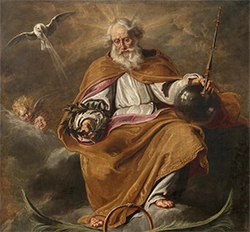
The Attributes of God
God as Creator
1. The Sovereignty of God in Creation
- Teaching Point 1: God as the Ultimate Authority
In the beginning, God created the heavens and the earth. (Genesis 1:1) emphasizes God's supreme authority over all creation.
- Teaching Point 2: Creation by His Word
And God said, 'Let there be light,' and there was light. (Genesis 1:3) shows the power of God's word in bringing forth creation.
- Teaching Point 3: Order and Purpose
The structured account of creation in Genesis 1 reveals God's intentional design and purpose for each element of creation.
- Teaching Point 4: God's Ownership
The earth is the LORD’s, and the fullness thereof, the world and those who dwell therein. (Psalm 24:1) underscores God's
ownership of creation.
- Teaching Point 5: God's Sustaining Power
He is before all things, and in Him all things hold together. (Colossians 1:17) highlights God's ongoing role in sustaining
creation.
Questions:
1. How does recognizing God's sovereignty in creation affect your daily life and decisions?
2. In what ways can you see God's order and purpose in the world around you?
3. How can acknowledging God's ownership of the earth change your perspective on environmental stewardship?
2. The Goodness of Creation
- Teaching Point 1: Creation Declared Good
God saw all that He had made, and it was very good. (Genesis 1:31) affirms the inherent goodness of creation.
- Teaching Point 2: Reflection of God's Character
Creation reflects God's attributes, such as beauty, order, and creativity.
- Teaching Point 3: Provision for Humanity
The LORD God made all kinds of trees grow out of the ground—trees that were pleasing to the eye and good for food. (Genesis 2:9) shows God's provision.
- Teaching Point 4: Creation's Role in Worship
The heavens declare the glory of God; the skies proclaim the work of His hands. (Psalm 19:1) illustrates creation's role in
pointing to God.
- Teaching Point 5: Human Responsibility
The LORD God took the man and placed him in the Garden of Eden to cultivate and keep it. (Genesis 2:15) highlights
humanity's role in caring for creation.
Questions:
1. How does the goodness of creation influence your view of God?
2. In what ways can you see God's character reflected in nature?
3. What practical steps can you take to fulfill your responsibility in caring for creation?
3. Humanity's Unique Role in Creation
- Teaching Point 1: Made in God's Image
So God created man in His own image, in the image of God He created him; male and female He created them. (Genesis 1:27)
emphasizes humanity's unique status.
- Teaching Point 2: Dominion and Stewardship
Fill the earth and subdue it; rule over the fish of the sea and the birds of the air and every creature that crawls upon the earth.
(Genesis 1:28) outlines humanity's role.
- Teaching Point 3: Partnership with God
Humanity is called to work alongside God in maintaining and cultivating creation.
- Teaching Point 4: Moral Responsibility
Being made in God's image includes a moral responsibility to reflect His character.
- Teaching Point 5: Relationship with Creation
Humanity's relationship with creation is one of stewardship, not exploitation.
Questions:
1. How does being made in God's image affect your self-worth and purpose?
2. What does responsible stewardship look like in your daily life?
3. How can you balance dominion with care in your interactions with the environment?
4. The Fall and Its Impact on Creation
- Teaching Point 1: Introduction of Sin
Cursed is the ground because of you; through toil you will eat of it all the days of your life. (Genesis 3:17) shows the impact of
sin on creation.
- Teaching Point 2: Creation's Groaning
We know that the whole creation has been groaning together in the pains of childbirth until the present time. (Romans 8:22)
reflects creation's longing for redemption.
- Teaching Point 3: Broken Relationships
The fall disrupted the harmony between God, humanity, and creation.
- Teaching Point 4: Hope for Restoration
Despite the fall, there is hope for the restoration of creation through Christ.
- Teaching Point 5: Role of Redemption
Believers are called to participate in God's redemptive work in creation.
Questions:
1. How does the fall affect your understanding of the current state of the world?
2. In what ways can you participate in the restoration of creation?
3. How does the hope of redemption influence your outlook on environmental issues?
5. The New Creation
- Teaching Point 1: Promise of Renewal
He who was seated on the throne said, 'I am making everything new!' (Revelation 21:5) promises a renewed creation.
- Teaching Point 2: Restoration of Harmony
The new creation will restore the harmony between God, humanity, and creation.
- Teaching Point 3: Eternal Dwelling with God
And I heard a loud voice from the throne saying, 'Behold, the dwelling place of God is with man.' (Revelation 21:3) emphasizes
eternal fellowship.
- Teaching Point 4: Fulfillment of God's Plan
The new creation is the fulfillment of God's original plan for creation.
- Teaching Point 5: Motivation for Present Action
The promise of a new creation motivates believers to live in a way that honors God now.
Questions:
1. How does the promise of a new creation impact your current life choices?
2. In what ways can you live in anticipation of the new creation?
3. How can the hope of eternal fellowship with God influence your daily interactions with others?
Select Pages
1 2 3 4 5 6 7 8 9 10 11 12 13 14 15 16 17 18 19 20 21 22 23 24 25 26 27 28 29 30 31 32 33 34 35 36 37 38 39 40 41 42 43 44 45 46 47 48 49 50

